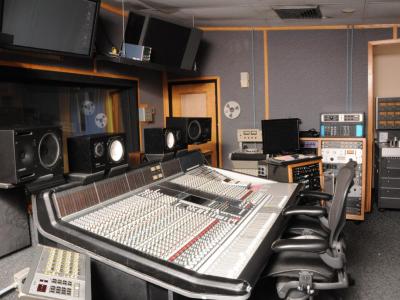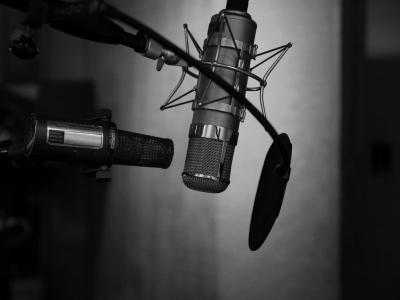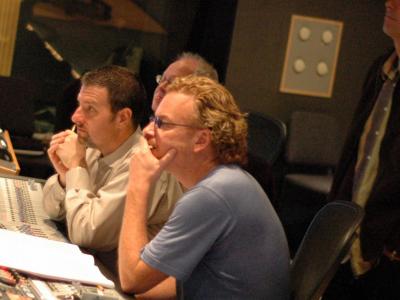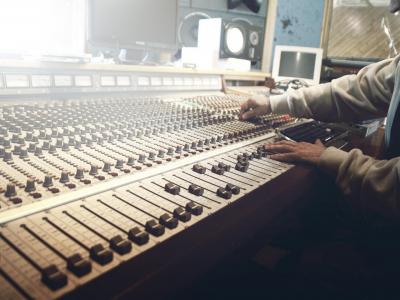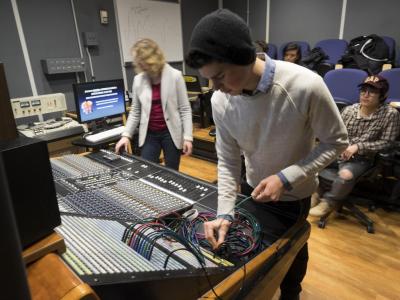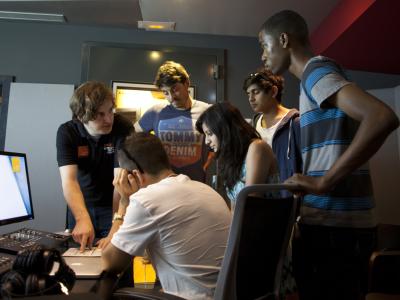Build complete productions from idea to release in this undergraduate music production course centered on Steinberg’s Cubase software. Develop fluency in MIDI sequencing, audio recording, loop creation, arrangement tools, automation, and mixing workflows used across songwriting, film scoring, and modern studio production.
Key Learning Outcomes
- Build complete music productions by recording, editing, and arranging MIDI and audio in Cubase
- Shape musical form, harmony, and structure using Cubase’s advanced composition and arrangement tools
- Craft professional-quality mixes using Cubase’s mixing console, automation, and processing tools
- Adapt Cubase workflows to support a wide range of production contexts and musical styles
Course Description
Producing Music with Cubase provides you with a broad skill set and a fully realized background in music production using the state-of-the-art Cubase software. Designed for professionals from the ground up, Cubase represents the cutting edge of digital audio workstations and provides powerful sonic tools that can be used to produce any style of music imaginable. This course begins with an introduction to the working environments and capabilities of Cubase. You will learn to record and edit MIDI and audio performances, while also considering the musical implications of using each recording and editing technique.
With audio and MIDI tracks in place, you will move on to learn mixing techniques using Cubase's powerful EQ, audio effects, and full automation to create a well-crafted production ready for distribution in various professional and consumer formats. Whether you are producing music for song demos, recording your band's album, or scoring music for film or TV, Cubase has all the right tools for the job. Each lesson in the course focuses on using specific tools to achieve a desired musical result. Weekly assignments provide hands-on experience to give you the confidence to move forward in creating great sounding productions.
By the end of this course, you will be able to:
- Configure and customize your Cubase environment
- Record and edit MIDI and audio files
- Use audio loops in your productions, including creating custom loops from your original recorded material
- Understand the process of equalization and apply effects processors such as reverb, delay, chorusing, and compression to enhance your production
- Manipulate your project's key and form using advanced tools such as the Play Order Track
- Use Cubase's flexible mixing console and cutting-edge tools to create professional-sounding mixes
- Design efficient Cubase project templates, key commands, and workflows to streamline production and session management
- Edit timing, pitch, and phase relationships in multitrack audio recordings to improve clarity and musical impact
- Prepare, export, and archive professional mixes for streaming, data delivery, and long-term project backup
Berklee Online and Steinberg have come together to offer an educational discount on Cubase software. Once you enroll in the course, you will be able to purchase the software at the discounted price through the Required Course Materials link on your My Home page. Early enrollment is encouraged to ensure software delivery prior to the start of the course. Depending on the shipping option chosen, software delivery could take up to eight business days. Read Less
Syllabus
Lesson 1: Cubase Overview
- What Can You Do with Cubase?
- Recording Basics
- Installing Cubase
- Introduction to the Work Environments of Cubase
- Additional Resources for Help
Lesson 2: Track and File Management
- Types of Files Used in Cubase
- Importing and Exporting Files
- Starting a New Project
- Project Settings
- VST Connections
Lesson 3: MIDI Sequencing and Virtual Instruments
- MIDI Overview
- Virtual Instruments
- The Transport and Metronome
- Recording MIDI
Lesson 4: Editing and Modifying MIDI Performances
- MIDI Tracks and Parts in the Arrange Window
- Editing in the Key Editor
- Edit In-Place, the List Editor, and MIDI Modifiers
- The Tempo Track Editor
Lesson 5: Recording Audio
- Audio Recording Basics—Microphones and Pickups
- Recording and Editing an Audio Track
- Editing a Drum Groove
- Phase Relationships
- Saving Your File for Posting
Lesson 6: Mixing and Equalization
- Mixer Signal Flow
- Starting a Mix
- The Equalizer
Lesson 7: Using Effects Processors in Your Mix
- Time-Based Effects Processors
- Dynamic Processors
- Modulation and Other Effects
Lesson 8: VST Instruments and Automation
- The VST Rack
- Automation
- Freezing
Lesson 9: Sample Editing and Loop-Based Music Production
- A Brief Definition and History of Sampling and Looping
- The Sample Editor and Looping, Part 1
- The Sample Editor and Looping, Part 2
Lesson 10: Working with Your Project's Form
- Musical Form and Cubase Markers
- The Arranger Track
- The Transpose Track
Lesson 11: Preparing Your Project for Mixing and Exporting Your Mix
- Preparing to Mix
- Track Duplicate and Nudge Tools
- Folder Tracks
- Subgroups
- Disabling and Freezing Tracks
- Mixing Audio Files
Lesson 12: Customizing and Managing Your Cubase Environment
- Final Touches—Mastering Your Mix
- Templates and Key Commands
- Remote Controls
- Backing Up Your Files
Requirements
Prerequisites and Course-Specific Requirements
Prerequisite Courses, Knowledge, and/or Skills
Students should have a basic working knowledge of either Mac or Windows computers. No prior knowledge of Cubase is required; however, you should have a basic foundation in music theory.
Textbook(s)
- No textbooks required
Software
- Cubase Pro 10.5 or higher
- Note: Cubase Artist or Elements are only acceptable if taking the course for non-credit, but there will be limitations in the course experience.
Hardware
- MIDI keyboard controller
- Audio interface
- XLR microphone and cable
- One of the following studio monitoring options (both recommended):
- Studio monitors (pair), as well as necessary cables
- Over-ear studio headphones
Student Deals
After enrolling, be sure to check out our Student Deals page for various offers on software, hardware, and more. Please contact support@online.berklee.edu with any questions.
General Course Requirements
Below are the minimum requirements to access the course environment and participate in Live Classes. Please make sure to also check the Prerequisites and Course-Specific Requirements section above, and ensure your computer meets or exceeds the minimum system requirements for all software needed for your course.
Mac Users
- macOS Monterey 12.0 or later
PC Users
All Users
- Latest version of Google Chrome
- Zoom meeting software
- Webcam
- Speakers or headphones
- External or internal microphone
- Broadband Internet connection
Instructors
Author
James Ross Ramsay, faculty in the Piano department at Berklee College of Music, has been teaching piano for 25 years, and has been included in the "Who's Who List of American Teachers" several times. He composes and produces music for local and nationally broadcast television, radio, cable, and video programs, and has been a featured soloist on piano and keyboards with various artists touring throughout the United States and Europe. Ramsay is a product specialist and clinician for Yamaha Corporation of America, Digital Musical Instruments, and Pro Audio Division. He received a Bachelor of Music from Berklee College of Music in 1986.
Instructor
Woody Pak is a composer, producer, and educator whose work spans film, musical theater, commercials, and emerging media. He brings a practical, real-world approach to music production, drawing on decades of professional experience—creating, recording, and delivering music across genres and platforms. As a faculty member at Berklee College of Music, Woody emphasizes workflow, creative decision-making, and adaptability, helping students use music production tools not just technically, but musically—as a means of translating ideas into finished, professional productions.
Instructor
Kevin is a Berklee Film Scoring (’05) alum that has worked as the U.S.A west coast product specialist for Steinberg’s Cubase for the last 6 years. He frequently gives master classes, clinics and demos at some of Los Angeles' top studios and production facilities such as Remote Control Productions (Hans Zimmer), Warner Brothers, Music and Motion Productions and Westlake Pro. He has a vast amount of experience in film composition, song and remix production as well as invaluable music and entertainment industry experience. Primarily, Kevin is a film, video game, and tv composer and has worked on a variety of projects including the recently released biopic “Pele - 2016”, “The Legend of Hercules - 2014”, “The Hundred Foot Journey - 2014”, “Million Dollar Arm - 2014”, a soon to be released X box game, and ABC television shows. In addition to his frequent collaborations with A.R. Rahman (Oscar Award Winning Composer for “Slumdog Millionaire - 2009”), Kevin is developing a new gestured based musical instrument with Intel Corp. and was featured at this year's Consumer Electronics Show (CES) with Intel’s CEO.
What's Next?
When taken for credit, Producing Music with Cubase can be applied towards the completion of these related programs:
Related Certificate Programs
Related Degree Majors
Questions?
Contact our Academic Advisors by phone at 1-866-BERKLEE (U.S.), 1-617-747-2146 (INT'L), or by email at advisors@online.berklee.edu.

